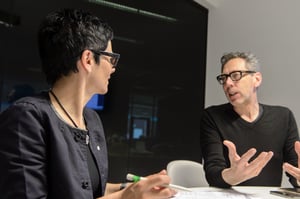
Building an Email List Is Consultancies' Ultimate Trust Weapon
.jpg?width=56&name=francescorizzato8%20(1280px).jpg)
This article was last updated on 19 October 2022.
87% of clients feel that TRUST has become a more important part of their purchasing decisions due to COVID, reports Source Global Research.
The global pandemic has accelerated the focus on trust in professional services. That’s an amazing, albeit not surprising, evolution!
When consultancies lose a pitch, they tend to look at the competition. That’s OK. Firms should be fully aware of their competitors and why they win pitches.
However, competition in consulting is not always what it seems. What I’ve learned, more often than we assume, it’s about the buyer who’s not willing to change to another consultancy.
Why? Because of a too low trust level and/or lack of transformative case studies from other clients in similar shoes.
It’s about the consultancy itself. It's not (always) about the competition.
How I utilized the power of an email list
Authority-led business development in consulting is about building visibility by establishing a reputational footprint and growing the trust in the firm's expertise in their market(s).
To help me with that, the email list of my target audience has been my secret trust weapon for almost a decade (and still is today).
When I started The Visible Authority in early 2020, I was able to accumulate almost 1,000 subscribers within the first 16 months. This is a highly targeted audience that I regularly engage and share my learnings with. I barely get any unsubscribes and my newsletter – The Authority – has a steady open rate of 40-50%! To give you some context: 20.13% is the industry average.
When I first started utilizing email newsletters, during my people analytics years, I didn’t even use email software as my target audience was only approximately 100 CHROs in Benelux. I was connected with 95% of them via a simple outlook email list.
These were the three principles I used to educate my audience for all those years:
- Learnings: what did I and my consultancy learn in the project trenches about the biggest client pains that others could learn from?
- Value for others: which experiences did our team acquire that could be valuable for others?
- Client stories: what were the unique client stories (with successes and struggles) that could inspire others to pursue better outcomes?
Here are just a few examples of what I shared via email:
- Magazine column: I wrote a monthly column in two leading HR magazines in Belgium and the Netherlands. My network received a PDF copy of those columns about two weeks after their publication;
- Speaking: I presented a lot at international conferences. I always negotiated participation discounts from the organizers and emailed these discounts to my network, including a friendly invitation to join the conference and a short introduction of my presentation topic;
- Case-based presentations: I presented quite a bit of case studies at those international conferences. I’ve always emailed my network a summary after the event. These never failed to produce a lot of positive feedback;
- Sharing new learnings: At the end of new projects (with new learnings), I always informed my network about my most recent learnings from yet another project. Of course, everything was kept anonymous – no company names or other identifiable info;
- Article curation: Each month I gathered interesting articles from around the world that I thought my audience would find of relevance, and I emailed them to my network (also shared via social media);
- Interview sharing: I was interviewed many times for several media outlets. I always forwarded those interviews to my network. Most interviews were in print magazines, so I emailed PDFs;
- News sharing: And many more small things in between, such as events, new research, new experts in the team, etc.
Here’s the thing: through my (low profile) email activity, my (almost entire) target audience in the Benelux region (with very few exceptions) knew me and my consultancy quite well, learned to understand what we were doing as a boutique consultancy and my area of expertise as a consultant, and received lots of ‘trust stuff’ about the expertise of our consulting business.
HR people from those days occasionally still talk to me about the educational emails they received from me.
Recommended reading: As A Consultancy Owner, You Always Attract What You Are, Not What You Want
My takeaways after a decade of sending emails to my target audience as a consulting leader
There are plenty of the statistics on the effectiveness of building and nurturing email lists. For example, one study found that for every $1 spent on email marketing, a business generated $42 in revenue. That’s 4,200% ROI!!
The success of building and utilizing an email list, however, varies from business to business. I learned that when consulting firms focus on quality, on sharing content that educates their audience, their email lists generate superior results in the long run.
By quality, I mean ‘never spamming the contacts’. Quality should be in the thought leadership pieces consulting firms deliver to their contacts – authentic, with real insights, addressing key pain points of their target clients. Consultancies' engagement with their audience via email is about what these firms learned and what individual consultants know that the prospects could benefit from.
Spammy? Forget it!
In my conversations with consultancies, I noticed a pattern in the thought process and the view of email marketing. It's either "It's a spammy promotional tool that makes us look salesy and desperate" or "Our marketing team is handling email campaigns, so I'm not sure what's going on there".
Email marketing is just a tool. It's how consultancies choose to use it – that's what makes it an effective business development tool or a channel for spamming contacts. I see too many consultancies using email to push self-promotional content that brags about their expertise and services. This strategy doesn't really get them far. Their open rates are low and unsubscribe rates high. Senior leadership ends up fully relinquishing the control over email campaigns to their marketing teams.
Here's the thing: people subscribe voluntarily. They WANT to hear what this specific consultancy has to say. This is a small token of their trust. The job of consulting firms is to nurture and grow that trust by sharing their expertise and providing answers to prospects' questions, addressing their pain points, and, thus, showcasing their subject matter authority.
These are my main takeaways:
- Crucial to long term success: building an active email list of the target audience is crucial to long term success in consulting;
- Robust ROI: the ROI of authority-led education-driven thought leadership is (amongst other things) in the growth of the email list of a firm (with loyal subscribers/followers);
- Systematizing the network: a consultancy's network and relationships with past clients and prospects don’t mean anything if the firm fails to ‘systemize’ them into an email list;
- Building visibility: growing visibility in the target market and building trust in the firm's expertise is barely possible without building an email list and nurturing the audience with high-value learnings, experiences, content,...;
- Lessons learned: nurturing prospects and clients with the consulting firm's latest learnings (as a team of experts) is an indispensable part of the authority-led business development mix in consulting (and incredibly underutilized).
Who said that thought leadership in consulting was difficult?
A great quote from author Jonathan Stark (he’s a big fan of building an email list):
All you have to do is be meaningfully different to your ideal buyers. If you can do that, they’ll pay a premium. Figure out how you are different, and lean into it hard.
Recommended reading: Relying On Your Network Is A High-Risk Consulting Growth Strategy
Interested in receiving all my learnings to become a better consultant? No spam, no BS. Pure teaching! Subscribe to my newsletter.
.jpg?width=66&name=francescorizzato8%20(1280px).jpg)
Luk’s extensive career in the consulting business, which spans more than 20 years, has seen him undertake a variety of influential positions. He served as the European CHRO for Nielsen Consulting (5,000 consultants in the EU), founded iNostix in 2008—a mid-sized analytics consultancy—and led the charge in tripling revenue post-acquisition of iNostix by Deloitte (in 2016) as a leader within the Deloitte analytics practice. His expertise in consultancy performance improvement is underlined by his former role on Nielsen's acquisition evaluation committee. After fulfilling a three-year earn-out period at Deloitte, Luk harnessed his vast experience in consultancy performance improvement and founded TVA in 2019. His advisory firm is dedicated to guiding consulting firms on their path to becoming high-performing firms, drawing from his deep well of consulting industry expertise and financial acumen.

